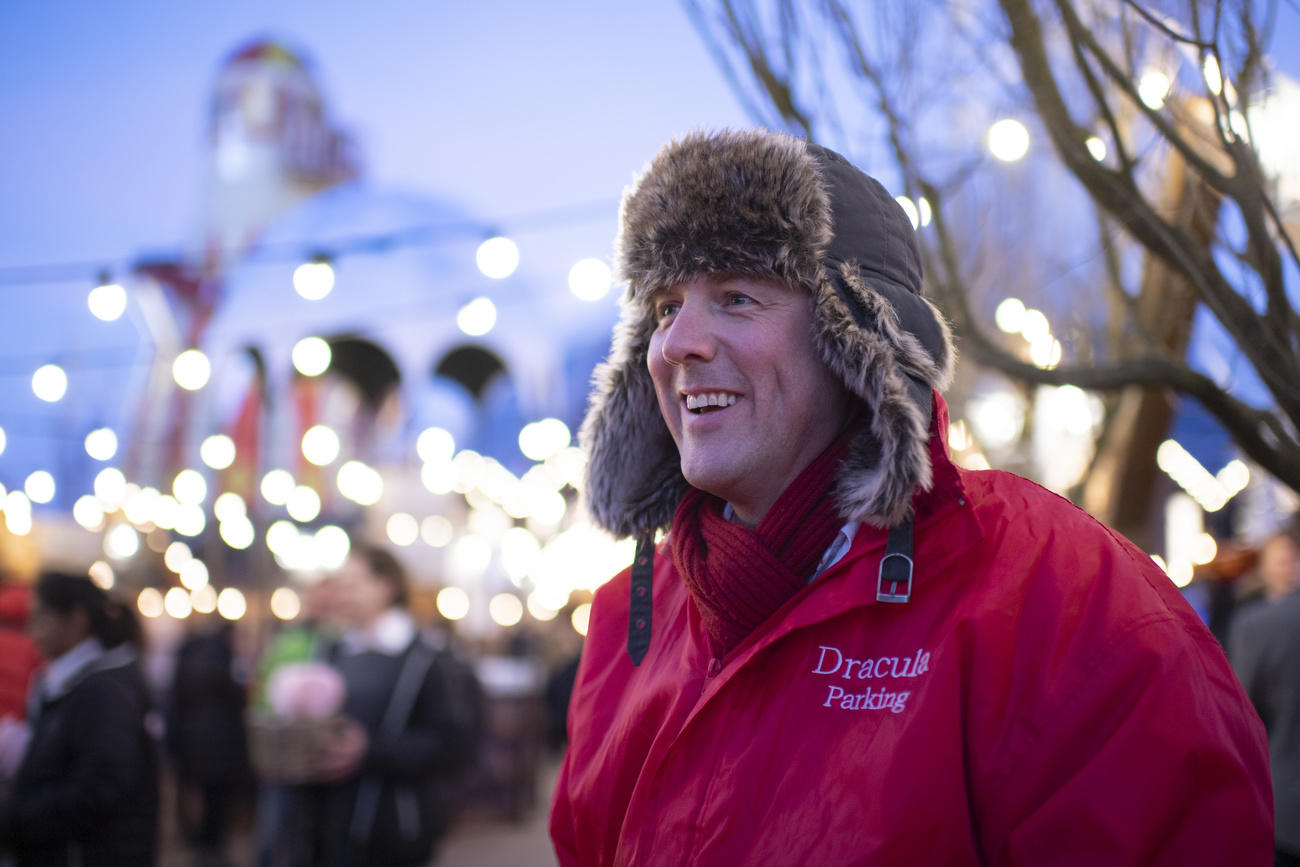Will letting foreigners vote revitalise St Moritz?

Christian Jott Jenny promises to breathe new life into the luxury resort of St Moritz in eastern Switzerland. One of his first radical moves as mayor is a referendum on foreigners’ voting rights.
JennyExternal link, who took office at the beginning of the year, hops on stage in the ornate concert hall of the Reine Victoria Hotel to present the community’s fully revised constitution.
The first item on the agenda is a surprise: giving voting rights to foreign residents. If accepted, the exclusive mountain resort in the Engadin valley would be one of the few places in the country to grant foreigners political rights. The people of St Moritz are due to vote on this constitutional change in 2020 at the earliest.
This text is part of #DearDemocracy, a platform on direct democracy issues, by swissinfo.ch.
This would be the first political coup for Jenny, who is used to being in the limelight but as an entertainer not as a political figure. After singing with the Zurich boys’ choir as a child, Jenny trained to be a tenor before he became director of the renowned Festival da JazzExternal link 12 years ago. During that time, he brought world-famous musicians such as Norah Jones, Chick Corea and Diana Krall to St Moritz.
Image problems
Last August Jenny decided to run for office with the goal of changing the way the town is perceived by locals as well as tourists.
St Moritz has always been viewed as a playground for the superrich. The village, with a population of about 5,000, still evokes the image of Russians in big fur coats sipping champagne and spending masses of money in luxury shops.
“When people think about St Moritz, they should think about a village that offers a bit more than other places,” Jenny told swissinfo.ch.
Winning the election in October 2018 was an extraordinary achievement in itself. First, he is not affiliated with any party and has no political experience. Second, as a Zurich native, he is considered a “lowlander”, even though he now lives and pays his taxes in St Moritz.
Not one of the locals
“I loathe the term ‘native’,” Jenny said during the interview in a restaurant in Zurich, where he still spends a lot of his time. “I find it racist. The Engadin is full of immigrants!”
He believes not having any roots in St Moritz is actually to his advantage as he doesn’t have any political or local bias.
Community events no longer take place in a multipurpose hall. Instead, they are held in the grandiose salon of one of the best hotels in town.
“My political party consists of the guests, tourists – but also the young people in the village. I don’t attend meetings of our local political parties, not even those of the ‘Next Generation’ Alliance, which I’m a member of.”

More
Swiss secrecy is alive in the super-rich wedding business
Next generation
Jenny was involved in setting up the ‘Next Generation’ Alliance last summer. The name refers to its members, which represent the next generation of hotelier families.
This next generation is now at the helm of many hotels and wants to have a say in the development of St Moritz. The fact that Claudia Aerni of the Corvatsch HotelExternal link and Nicolas Hauser of the Hauser HotelExternal link were voted into the 17-strong municipal council, which together with the local assembly forms the town’s legislative body, shows how much their influence is growing.
Daniela Märky, manager of the Steffani HotelExternal link, also belongs to this new generation. Märky, who is not politically active, openly says she voted for Jenny like many other young residents of St Moritz, especially those in the tourism industry. “He’s a doer and brings the changes St Moritz needs,” she says.
“St Moritz had lost sight of the key issues,” Märky observes, emphasising that it was high time to revitalise the city centre, including a ban on traffic.
Globalisation has brought about new challenges, she adds. “St Moritz’s competitors are no longer in Zermatt or Gstaad. We now compete with places like Mauritius, New York or Tuscany. Potential visitors have become more mobile and more spontaneous in their decisions due to the ease of online booking.”
Jenny also sees this competition as a main challenge. “Some 99% of the people of St Moritz live off tourism,” he says. Around 150 years ago, visitors stayed in St Moritz for two or three months. “Fifty years ago they were still staying for two to three weeks. Now they’re coming for two to three days.”
Personal involvement
To revamp the town’s image, Jenny is counting on its creativity and cooperation. “With 42 galleries in such a small space there’s a lot of culture and illustrious guests. This has always fascinated me about St Moritz,” he says.
Jenny is not afraid to speak his mind to make the necessary changes, even if that means ruffling a few feathers. For example, a local resident tried to put a stop to an entertainment project of the heir to Sika, a giant producer of construction chemicals. This included a bobsled museum, a cinema and a nightclub.
Jenny called the person who opposed the project to a face-to-face meeting. He told him one shouldn’t frighten off someone who has a passion and wants to create a public meeting place by talking about building permits. The person withdrew his veto.
Location promotion
Jenny has also intervened in another high-level case involving Tyler Brûlé, the entrepreneur and founder of the magazine Monocle. The Canadian spent a year looking for a venue to open a café in St Moritz but was continually rejected and nearly gave up. Jenny has now personally offered to help him find a solution.
In order to avoid such situations in the future, Jenny wants to establish a location promotion platform that mediates between local business owners and potential tenants or buyers.
“My advantage is that I’m not planning a political career. I see myself much more as the person who gets things going.”
Voting rights in St Moritz
Some 2,000 of St Moritz’s roughly 5,000 residents do not have Swiss citizenship. The share of foreigners (41%) is thus far higher than the Swiss average of 25%.
Without skilled workers from abroad, the Alpine village would struggle to function. Christian Jott Jenny aims to give foreigners in St Moritz the right to vote as well as stand for election.
Graubünden is one of only three Swiss cantons that give their municipalities the option of granting voting rights to foreigners. Five cantons in western Switzerland say their communities must offer voting rights to foreigners. Jura and Neuchâtel are the only cantons that grant voting rights to foreigners at a cantonal level.
(Translated from German by Billi Bierling)

In compliance with the JTI standards
More: SWI swissinfo.ch certified by the Journalism Trust Initiative












You can find an overview of ongoing debates with our journalists here . Please join us!
If you want to start a conversation about a topic raised in this article or want to report factual errors, email us at english@swissinfo.ch.